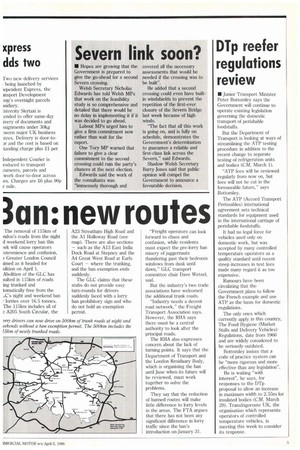Dip reefer regulations review
Page 5

If you've noticed an error in this article please click here to report it so we can fix it.
• Junior Transport Minister Peter Bottomley says the Government will continue to operate existing legislation governing the domestic transport of perishable foodstuffs.
But the Department of Transport is looking at ways of streamlining the ATP testing procedure in addition to the recent change to separate testing of refrigeration units and bodies (CM, March 1).
"ATP fees will be reviewed regularly from now on, but fees will not be cut in the foreseeable future," says Bottomley.
The ATP (Accord Transport Perissables) international agreement sets technical standards for equipment used in the international carriage of perishable foodstuffs.
It had no legal force for vehicles used only on domestic work, but was accepted by many controlled temperature operators as a quality standard until recent steep increases in test fees made many regard it as too expensive.
Rumours have been circulating that the Government plans to follow the French example and use ATP as the basis for domestic regulations.
The only ones which currently apply in this country, The Food Hygiene (Market Stalls and Delivery Vehicles) Regulations, date from 1966 and are widely considered to be seriously outdated.
Bottomley insists that a code of practice system can he "more rigorous and more effective than any legislation".
He is waiting "with interest", he says, for responses to the DTp proposal to allow an increase in maximum width to 2.55m for insulated bodies (CM, March 29). Transfrigoroute UK, the organisation which represents operators of controlled temperature vehicles, is meeting this week to consider its response.


























































